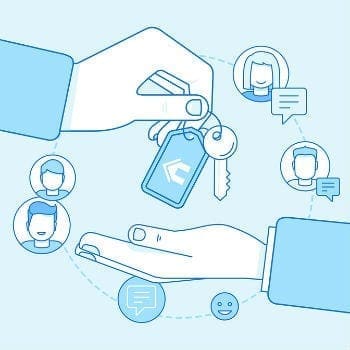 The exponential growth of online marketplaces over the past few years has been no short of an unpredicted phenomenon. The growth of the marketplace economy led by sharing economy companies is set to double between 2017 and 2022, growing from $19billion to $40billion. Beyond well known ecommerce marketplace brands like eBay, Amazon, Airbnb, Uber or Grubhub, marketplace models are disrupting just about every traditional industry. The travel industry is no exception. Peer-to-peer marketplaces for travel are on the rise and here to stay.
The exponential growth of online marketplaces over the past few years has been no short of an unpredicted phenomenon. The growth of the marketplace economy led by sharing economy companies is set to double between 2017 and 2022, growing from $19billion to $40billion. Beyond well known ecommerce marketplace brands like eBay, Amazon, Airbnb, Uber or Grubhub, marketplace models are disrupting just about every traditional industry. The travel industry is no exception. Peer-to-peer marketplaces for travel are on the rise and here to stay.
The idea is simple. If a traveller cannot go on a trip—due to an illness or other issue—there are marketplaces where they can sell the pre-paid hotel reservation to another traveller who is going to the same place at the same time. The sellers can recoup some of the cost of the non-refundable reservation, and buyers purchase a discounted room.
The hotels are an integral part of this new market and they benefit immensely from the secondary market from increased revenues, occupancy and improved customer satisfaction. That’s a win-win for both the hotel and its customers.
Marketplaces can help travel agencies, hotels and tour operators with their own cancelling customers who want to post their rooms for sale instead of paying a cancellation fee or losing the payment already made to the hotel. Filling up rooms which will otherwise remain empty is where the secondary market helps the hotels increase occupancy rates, revenues and customer satisfaction, while the hotel still receives the payment in full from the original guest.
While there are many fully non-refundable reservations, the majority of hotel cancellations penalties are one-night cancellation fees, which take place in the 24-72 hour window prior to the check-in, in addition to no-shows. Due to the nature of the last minute notice, it’s not easy for the hotel to re-sell the reservation and recover the room night revenue in full. In addition, it is better to have the guest actually occupying the room because they will spend money at the restaurant, minibar, room service, and other incremental expenditure — which accounts for up to 40% of room night revenue for full-service hotels.
Hotels can greatly improve customer satisfaction by helping cancelling guests resell their reservations. These happier customers are much more likely to become repeat customers. In addition, marketplaces turn cancelling customers into the hotel’s biggest promoters. If guests have received a good cancellation service from the hotel, they will become the brand’s loyal promoters on social networks and review sites while trying to find a new guest for their booking. This exposes the band to new customers at zero acquisition cost for the hotel.
This is all good news for the industry. Peer-to-peer marketplaces help hotels increase the average daily rate, retaining high occupancy and increasing revenues from food and beverage. More generally, hotels still get paid in full for the entire stay by the original guest (rather than just a cancellation fee), tap into the emerging segment of impulse bookers and secure the incidental revenue stream generated from the new guest’s spend on food and beverage and other incidentals.















